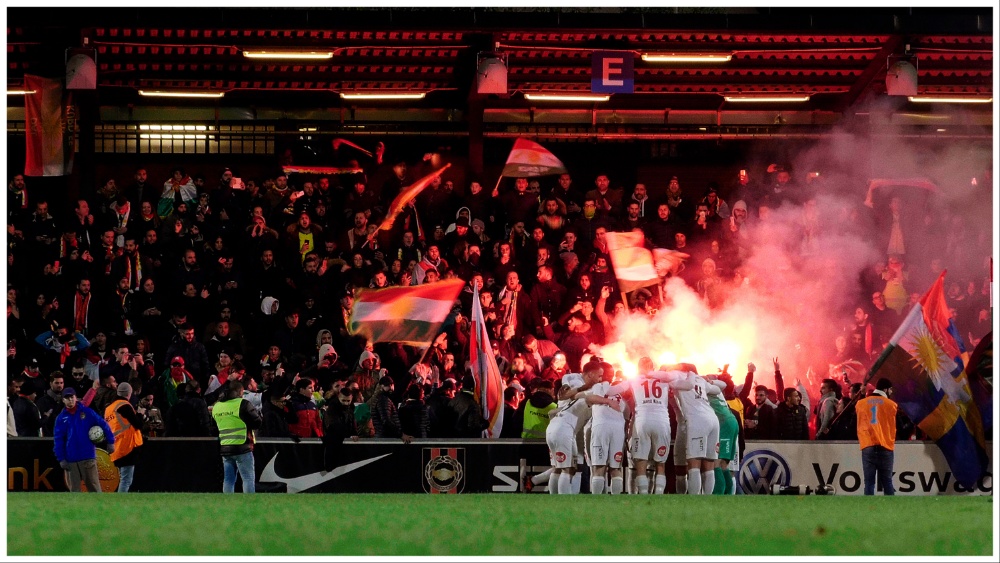
The producers of “Allihopa: The Dalkurd Story,” which follows a nail-biting stretch in the Dalkurd soccer club’s pivotal 13th season, have released a clip (below) in advance of the film’s world premiere at Toronto’s Hot Docs festival, which kicks off April 27.
Dalkurd was founded in 2004 by Kurdish refugees in Sweden as an activity for Kurdish youth in a working-class town. The team immediately and swiftly rose through the country’s professional soccer ranks, its unprecedented success attracting media attention in Europe and abroad—despite notably lackluster local attendance—and making the team a symbol of victory and unity for Kurdish people around the world.
In the film, Dalkurd, whose multinational roster includes Kurdish and Swedish players, needs one more win in order to clinch its first-ever spot in Allsvenskan, the top tier of the Swedish soccer league system.
Kurdish Canadian director Kordo Doski—who has a personal connection to both the sport and region where the film was made— tracks the on and off-pitch lives of co-captains Rawez Lawan and Peshraw “Pasha” Azizi, and also reveals the complex character of the club and its community, and the impact of the Kurdish people’s political struggles on the team’s Kurdish players.
“When ‘Allihopa: The Dalkurd Story’ landed on our desks, we not only felt the heart of this beautiful story, but also immediately recognized the familiarity of the obstacles facing the Dalkurd team,” executive producer David Oyelowo told Variety last week.
“The natural charisma of Rewan (Amin), Rawez, and Pasha and how they and the rest of the team came across on screen truly tugged on the heartstrings for us, personally. This narrative relates to audiences across the globe while maintaining its specificity within the Kurdish identity.”
Yoruba Saxon, the production company Oyelowo co-founded and runs with his wife Jessica, saw an early cut of the film in 2021 just as the company was beginning to source specifically unscripted projects. (Yoruba Saxon has a first-look deal with Walt Disney Pictures for feature length films and an overall deal with ViacomCBS for original scripted and unscripted series.)
“After several conversations with Kordo it became clear the company’s general ethos heavily aligned with this project. Before we knew it, we were jumping onto Zooms with Kordo and discussing the overall objective of the film.
“Kordo shared his story from a filmmaker’s perspective as well as how the film’s nuance came directly from his own experience as a Kurd with a footballer background,” Oyelowo added. “It became a relationship between his team and our unscripted team to get the film into a place that was ready to submit to festivals.”
Doski was born in Kurdistan, Iraq, and moved with his family to Toronto in 1982, bouncing between the city and nearby tech hub Kitchener-Waterloo and playing soccer on all-star and regional teams. “I lived in a neighborhood with kids from other ethnicities—Greek kids, Italian kids, Jamaican kids—and soccer was something we all had in common at that age,” Doski told Variety.
He moved to California on a soccer scholarship in 1995—“before Major League Soccer was around”—but a knee injury sent him home within his first year. He eventually played with his Canadian university team while earning a media studies degree, shifting his focus to storytelling by starting “in the acting lane.” In 2007, he returned to California, where he still lives, and began auditioning.
“My life as a starving actor was better than anything I ever auditioned for—that was eye-opening,” he said. “Although I booked some stuff, and was lucky in some respects, I made a choice early on to not play stereotypical Middle Eastern parts, and that eventually pushed me to start writing stories I could see myself in.”
Soon after Doski finished his first feature, “Mikael” (2016), he and his wife, makeup artist and entrepreneur Lina Hanson—who grew up in the region where Dalkurd was based—relocated temporarily to Sweden when her father fell ill. “It was always about Dalkurd with me and my Swedish father-in-law; the team is how we broke that cultural barrier, that language barrier.”
Doski caught a handful of games before reaching out to the captains and asking to spend a day with the team. “I played soccer for many years but never truly identified myself as a soccer player,” Doski said. “This film is much more than soccer. It’s much more than the Kurdish experience. It’s about the human experience. It’s about changing our circumstances.” Doski and Hanson, both producers on the film, financed a majority of production costs through their skincare-line company. “It’s about betting on yourself, betting on your vision and, more importantly, betting on a story that you feel the world needs to know,” he said.
Oyelowo hopes audiences will see themselves in the journey that Dalkurd and the rural town in Sweden take collectively. “This story doesn’t stay steeped in struggle, but instead amplifies the voices of a people group that so often has been overlooked,” he said, “and we hope viewers go home with a new POV on these innate themes of brotherhood, team unity, tradition, and identity.”
Doski cowrote the film with José Moreno Brooks. The producers are Doski for Beige Films, Hanson for Lina Hanson Global Beauty, Moreno Brooks for No Hay Mal Productions, and Paul Canterna, who is also the contact for the film at Hot Docs. Executive producers are David Oyelowo and Jessica Oyelowo for Yoruba Saxon, Bailey Dahlgren, and Ary Dosky.













